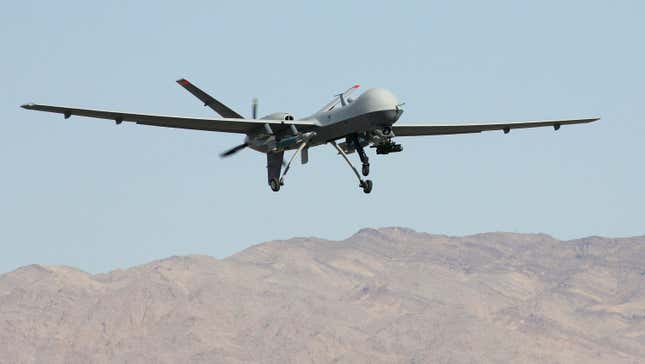
Diplomats from around the world met in Geneva this week to hammer out agreements on how to manage autonomous weapons systems with many calling for an outright ban of the technology. One country is notably opposed to those agreements: The United States.
At the talks, first reported on by The Guardian, US official Josh Dorosin disagreed with calls for binding legal instruments to limit the use of autonomous weapons, insisting instead on more voluntary efforts.
“In our view, the best way to make progress,” Dorosin said, “would be through the development of a non-binding code of conduct.” By opposing the ban the U.S. joins the company of Russia, China, and India, which have all turned their nose up at the idea of a “killer robot” ban.
Those proposed bans would apply to lethal autonomous weapons systems that can perceive their own environment and make a decision, potentially leading to a human death, notes The Financial Times. The exact form factor of these systems can vary and could include ground drones, or aircraft. Those criteria notably wouldn’t include the types of drones already regularly used by the U.S. and other militaries in battles since those systems still require a human operator to make final decisions. More self-sufficient autonomous systems are definitely being developed though.
The U.S. government’s hesitancy around banning autonomous weapons stands in stark contrast to a growing collection of activists and nations. So far, at least 30 countries have already voiced support for banning autonomous weapons systems according to The Washington Post. Costa Rica and New Zealand added their names to that list this week, with the latter’s minister in charge of arms control saying the military deployment of such technologies is “abhorrent and inconsistent,” with the country’s values.
Rights groups from countries around the world have also voiced support for a ban, including Human Rights Watch, which said governments need to prioritize humanity over automation. “Why do we let ‘killer robots’ decide when to use force?” the organization asked. “Without meaningful human control, ‘killer robots’ pose serious threats.”
Calls for autonomous weapons bans have even gained the support of UN Secretary-General António Guterres who last year released a statement saying synch systems should be prohibited under international law.
Not only is the U.S. uninterested in limiting autonomous weapons, but it’s also actively being advised to move in the opposite direction. Several years ago, the U.S. formed the National Security Commission on AI, whose ultimate goal is to gather intelligence and produce major reports for the president and Congress proposing solutions for advancing AI in national defense. That commission is headed by former Google CEO Eric Schmidt and includes other tech titans like Amazon’s Andy Jassy and Microsoft’s Eric Horvitz as commissioners.
In a nutshell, the group’s 2021 report specifically pushed back on entering an autonomous weapons ban and instead pressed for a ramping up of military AI investment to maintain superiority over China and Russia.
“As these authoritarian states field new AI-enabled military systems, we are concerned that they will not be constrained by the same rigorous testing and ethical code that guide the U.S. military,” the report read.
The authors go on to suggest autonomous weapons systems may represent an inevitability, given the increasing number of complex decisions operators will be forced to make in future battles.
“The best human operator cannot defend against multiple machines making thousands of maneuvers per second potentially moving at hypersonic speeds and orchestrated by AI across domains,” the report reads.” “Humans cannot be everywhere at once, but software can.”
So, even as pressure worldwide mounts to ban autonomous systems, the U.S. appears poised to use the “but if we don’t do it China will,” argument for the foreseeable future.